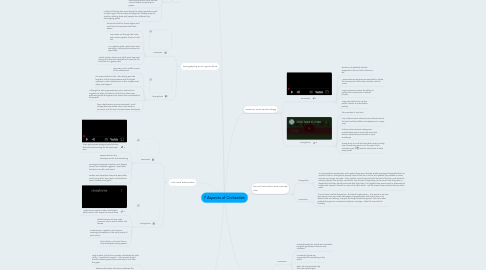
1. Geography and Agriculture
1.1. Sumerians
1.1.1. Sumerians built the levees higher and used them to keep back the flood waters
1.1.2. river water ran through the holes and made irrigation channel in the soil
1.1.3. An irrigation system took which took planning in draining the marshes for agriculture.
1.1.4. Wheat, barley, sheep, and cattle were foremost among the species cultivated and raised for the first time on a grand scale
1.2. Shang/Zhou
1.2.1. core area in the middle course of the Yellow River
1.2.2. It is assumed that in the 15th century BCE the kingdom of the Shang experienced its largest expansion, with colonies even in the Yangtse River valley and beyond
1.2.3. Although the Shang Dynasty was not as advanced in irrigation as other civilizations of that time, there was sufficient growth that gave more leisure time and wealth to the people
1.2.4. their cities became more modernized. Small villages became walled cities, class division occurred, and the use of oracle bones developed
2. Economy and Trade
2.1. Sumerians
2.1.1. Sumerians of Mesopotamia first started to trade with Harappan civilization of the Indus Valley
2.1.2. The Sumerians used clay tokens for their currency
2.1.3. The highest class was made of priests
2.1.4. The middle class was made of merchants,scribes, and artisans. Most of the people were lower class.
2.2. Shang/Zhou
2.2.1. Found shops on the outskirts of excavated places
2.2.2. organizing the farm and tax collection was done by many government officers
2.2.3. China was divided into a number of small states competing for power
2.2.4. method of fishing also arise during the Shang Dynasty as well as other type of commodity exchange like trading crops for another, settling deals with people from different city exchanging goods
3. Arts and Education
3.1. Sumerians
3.1.1. Their writing used wedge shaped strokes that influenced writing for the next 3000 ears
3.1.2. Responsible for the development for the first writing
3.1.3. Sumerians produced sculptures and objects carved from alabaster, gypsum, lapis lazuli, limestone, marble, and wood.
3.1.4. Details and decorative elements were often inlaid usIng shell, lapis lazuli, red limestone, black limestone and gold.
3.2. Shang/Zhou
3.2.1. Made bronze vessel masks called toatie which were in the shapes of animal faces
3.2.2. skilled workers in bone, jade, ceramics, stone, wood, shells, and bronze
3.2.3. Confucianism, Legalism, and Daoism. Leading philosophers in the early history of each school
3.2.4. first culture in China to have a fully developed writing system.
4. Government and Leaders
4.1. Shang/Zhou
4.1.1. early leaders of the Zhou Dynasty introduced the idea of the "Mandate of Heaven". This concept taught that the leaders gained their authority to rule from the gods
4.1.2. believed that when the Zhou overthrew the Shang Dynasty, this was because the Shang had become tyrants and the gods allowed them fall.
4.1.3. Zhou was based on the feudal system. The emperor divided the land into fiefs that were usually ruled by his relatives. The nobles who ruled the fiefs basically owned the farmers who worked their lands.
4.2. Sumerians
4.2.1. Each city-state had begun to collect taxes and record them with scrolls
4.2.2. Each city-state had their pwn irrigation system that the leader oversaw
4.2.3. The ruler took the role of the priest
4.2.4. As the Sumerians became more complex city-states started joining together with one ruler/priest
5. Social Structure and Family Life
5.1. shang/zhou
5.1.1. The Shang/Zhou people were not invaders they were Chinese speaking people descended from he neolithic culture. Shang/Zhou dynasty lived off the land, and as time passed they settled on farms and were no longer nomadic. They created a social pyramid with the kind at the top, next were the military nobility, then priests, merchants, and farmers. Depending on the social class they were in depended how they would be buried after they died. The highest class were buried in elaborate pit tombs with objects of wealth in case of life after death. And the lowest class could be thrown down wells.
5.2. Sumerians
5.2.1. The Sumerians called themselves "the black head people." The womens role was grind grain, cook and make beverages, especially beer and how to spin and weave cloth for clothing. The girls are taught these things also, then soon after puberty the girls are considered ready for marriage. While the men did the hunting.
6. Science and Technology
6.1. Sumerians
6.1.1. Evidence of wheeled vehicles appeared in the mid 4th millennium BC
6.1.2. Mesopotamian astronomers were able to follow the movements of the stars, planets, and the Moon
6.1.3. major achievement was the ability to predict the movements of several planets
6.1.4. They were the first to use the potter's wheel to make better pottery
6.2. Shang/Zhou
6.2.1. the invention of cast iron.
6.2.2. crop rotation which allowed more efficient use of the land and the addition of soybeans as a major crop
6.2.3. first time when bronze casting was industrialized and bronze tools and ritual bronze vessels were produced in royal workshops
6.2.4. Shang times on until the twentieth century, today even sometimes used in art, the cyclic lunar calendar (yueli 月曆) was the instrument to date every event
7. Religion
7.1. Sumerians
7.1.1. They believed their world was controlled by gods, goddesses, demons and monsters
7.1.2. Hundreds of gods are responsible for everything in the world
7.1.3. Each city was protected by their own special god
7.1.4. Demons were created by the gods, they could be either evil or good
7.2. Shang/Zhou
7.2.1. Zhou Dynasty is famous for the beginnings of two major Chinese philosophies: Confucianism and Taoism
7.2.2. Taoism was introduced by another famous philosopher Lao Tzu. He introduced the concept of the yin and the yang.
7.2.3. bronze vessels and burial offerings show how the former people have been venerated
7.2.4. highest god was Di or Shangdi who was especially responsible for natural powers like wind and rain
